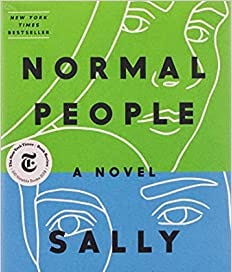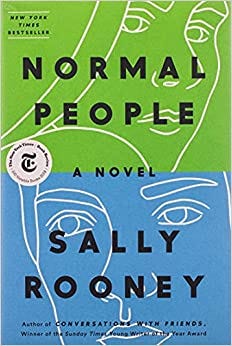She Licks Her Teeth, Unconcerned
REVIEW: Sally Rooney's Normal People is a vision of hell and eternal torment
On tonight’s episode of Final Canticle, we’re discussing Sally Rooney’s Normal People. The book is another in our attempt to acquaint ourselves with the books of today, or of recent todays at least, and this one was published in 2018, a world away but still today. The thing it might call late capitalism is now a little later, but our souls are still the same. They might seem a little emptier, but in fact they haven’t changed much. You and I are still here in eternity, which without some blessed mercy of truly passing time still could turn out to be torment.
Straight to it, then — Normal People is not a will-they-won’t-they romance or a tragicomedy of manners, but a vision of hell and eternal torment for its poor heroine Marianne. She has been subdued into receptiveness at an early age in the abusive household of her departed father, a prison that is now Gothically perpetuated in the dread figure of her brother, and the novel is the account of her discovery of the prison’s walls and her pathetic attempts to get free. Ultimately she finds she can’t, and though along the way she gets something like love and something like pity, these are only passing. In the end she is discarded, no longer of use.
The fundamental senselessness of this tragedy, the horrid human isolation and emptiness, is the real thing to see in the book, and not, say, a redemption of first love or a meditation on social class or an account of “how Millenials are hooking up these days”. And senselessness might indeed be apt for all of what we need to say, because the first thing you’ll notice when you start reading is how strangely numb the style is. The book’s cover art is perceptive: we see a pair of sketched-head mannequin dummy lovers, empty of any color, texture, or warmth. They have no expressions except through their features’ hard lines, and otherwise in their faces and so too in our mind’s eye there is a sense of pressing blankness, as if we can’t see clearly. The novel has hardly any visual descriptions, especially in the beginning, but when they arrive they are often only in one expressive part. We see a hand, an eye, lips, teeth, a collarbone, or clothing, but never the whole body. This was so striking early on that I started calling it the book’s style of “amputated perception”.
What awakens such amputated stirrings of sense is primarily sex, which wells up from the small cold machine-like bottom of these characters’ consciousness — blushing, sweaty, half-painful. The male lead, Connell, is said to be quite a blusher, but in the first scene where Marianne starts showing her feelings for him and he responds, he might as well be an old radiator shivering into warmth. We can’t see his face, his body, even the room they’re in — we just have Marianne’s words and his words back to her blankly pressing on us, and then he warms up in his half-choked blush, feeling something wordless in him trying to come out.
If sex is wordless, maybe it’s because it’s fundamentally animal and so is always that way. Or maybe it is that we don’t have words for it yet, that we might look back afterwards and only then could understand. It does have meanings, and despite its overpowering nature we do have a say in what those meanings will be. We have no universal theory of this, maybe, but we can say at least that common sense teaches us that as we get older Reason starts to intervene more often in our relationship choices. Sex may announce itself and take hold, but before or afterwards we have choices — for ourselves and for others — and those choices have consequences.
Connell keeps repeating the most destructive choices, horrid empty self-preserving obscurantist dead-faced choices that only drive us further into the worship of sex’s power to silence us. That silence apparently is given voice in Connell’s writing life, about which we and, shockingly, Marianne know almost nothing. Good for Connell, to get some private relief from all that choked-up non-communicativeness, and maybe he gets a short story out of the deal! But you young stupid wasteful fool, you literary lunkhead — ! Your stories have cost your lover her life — the integrity of your love and so too of her life keeps getting dropped and broken by none other than careless you, Connell, irresponsible you.
I have to reject the fantasy of some kind of shared or “distributed” self on the part of the characters or Rooney herself — some non-individualistic idea of relationships that is supposedly more twenty-first century than some other idea that came before. It’s all just the worst kind of vibe-driven flakiness meant to justify stasis and non-action, the dead heavy weight of which seems weirdly always to lead us down into an exploitive sado-masochism. If “cost” and “value” as metaphors for the meaning of our separate selves are too capitalistic for Rooney to stomach, it makes no difference to poor Marianne, whose life, despite intermittent consolations, is chiefly defined by the plunder of feeling, meaning, and sex by cruel and careless men. Perennially undervalued, emptied out and robbed, she is a fable of crushed potential.
In this view she joins Isabel Archer from Henry James’s Portrait of a Lady, who like Marianne stands apart from the world, with a rugged will and a perceptive mind. Isabel would seem to have more to lose than Marianne does, but this is only evidence of our decline. She is more innocent than Marianne, almost more of a child, and her choice of Osmond as husband is so catastrophically wrong that we beg for any hint of why, and don’t receive one. James plays games with us, writing with an open and illuminating psychological perspective and then shutting us out of the darker causes of his characters’ actions. The non-answers lie at the center of his devious designs, the hidden room in the mansion of his novel.
Normal People is less like a mansion and more like a European metro station, brisk with cold conditioned air and clean, with hard edges. Anyone can look anyone else in the eyes and know exactly what’s between them. Hopelessly overdetermined, we have not non-answers but the one answer: power, sado-masochism, abuse. Dead as machines and automatic, flitting and furious and lifeless as widgets on a webpage, Rooney’s people know they are in a System, know that they themselves are systems that function coldly, know that life is not a pursuit, not even a game, but more like a series of lotteries we watch carefully, and then we take what we can claim. Life is timing and image and opportunity, and love and sex in the meantime are just nameless power, of which we can make no sense. And there is no sense to be made, no time for that really — we have our opportunities, we have our stations to rise from.
For men, Isabel in Portrait of a Lady has her cousin Ralph, the stunted aesthete, almost perverse; Caspar Goodwood, the indomitable Puritan suitor but flat and stiff, upright as a two-by-four; and Osmond, the vicious little collector of people, supposedly artistic but actually quite boring. And then there’s Madame Merle, schemer and witch, and little Pansy, the secret daughter of Merle and Osmond, another captive.
Marianne has bad suitors too — she too makes choices, and terrible ones. But who could blame her? Apparently in 2018 your options are: sociopathic Wall Streeter with an easy taste for strangulation; evil European Bad Art Boyfriend, who hits you and ties you up and tells you you’re worthless and takes bad photographs of you; and Connell, vaguely literary smart boy, cute and confused and ultimately out for himself. Where’s an earnest woman to turn?
At one point in Portrait of a Lady, it’s implied that Isabel and Osmond’s intimacy has gone cold, and there’s something of a sigh of boredom and restlessness in the narration of Isabel’s thoughts. If only we could bless Marianne with some boredom, who instead gets metaphorically walked on, and then literally choked and beaten! Imagine Isabel in such circumstances!
Where have we landed? There is no one to ask for directions, and we find no hope here, this far in the future. Connell declares his love for Marianne, he finally stands up to her brother at the end of the book, but all of it is senseless. She still bows to all of Connell’s whims and needs, like she always has. If there’s any comfort there, it’s empty. And truly he shows us this emptiness all over again in the final scene, repeating the same self-serving behavior he always returns to.
Amidst their initial love affair, Connell asks some other girl to the high school dance and his relationship with Marianne just dissipates, for the sake of his social status. In college, again back together and supposedly happy and close, he can’t even bring himself to ask her to live at her apartment for the summer because of some vague shame around social class, so he goes home and they simply stop talking. Now here he is again at the end — they’re older, they’re wiser, they’re more loving, more self-knowing, aren’t they, aren’t they? — and he’s hidden his grad school applications from her. He manipulatively guilts her when she responds with anger and dismay, and she quickly acquiesces, and suddenly he’s the same dumb teenage boy he was when they met, sheepishly asking her to make the decision for him. Should he go abroad for his own goals (his stupid writing!) and, it’s implied, halt their relationship yet again? Will she let him?
She closes her eyes. He probably won’t come back, she thinks. Or he will, differently. What they have now they can never have back again. But for her the pain of loneliness will be nothing to the pain that she used to feel, of being unworthy. He brought her goodness like a gift and now it belongs to her. Meanwhile his life opens out before him in all directions at once. They’ve done a lot of good for each other. Really, she thinks, really. People can really change one another.
You should go, she says. I’ll always be here. You know that.
She speaks with the voice of a captive, knowing now there’s no way out.
If you liked this essay, consider reading my follow-up posts: an essay on the book’s politics, a review of the TV show, and a poem.





finally a critique of this book that makes sense to me!
Wow, this was just extraordinarily terrific, especially your linking Normal People with Portrait of a Lady. To me one of the most chilling lines in all of English literature is when Isabel says that Osmond and Madame Merle “made a convenience of me.” That is all evil is--using other people for our convenience.
The connection I make is with Succession, because both Succession and Normal People demonstrate with undeniable power that money and status are completely irrelevant when compared with whether one grows up in a happy and loving family, or whether one grows up being abused and made a convenience of. Connell, for all his class-based shame, has a loving mom, and he will be ok. No one would ever choose Marianne’s family, or the Roys, over Connell’s cleaning-lady single mom.